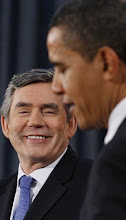As the Victory approached the allied line, she had already suffered 20 dead and 30 wounded. The dead had gone over the side, if only to prevent their blood making the workspace of battle unusable. The wounded were all ready clogging the surgeons' tables. According to Nelson's specific instructions, their knives were warmed. The coldness of the steel at the amputation of his arm in the Canaries was something he wanted no one else to suffer. The silence was over; the shrieking came up from below.
This wounding of ship and crew, before a single shot had been fired in response, was an entirely conscious part of Nelson's plan. He knew that the spearpoints of the two British columns would take the most terrible battering from the enemy fleet. He had decided that the strongest ships in the squadron, the three-deckers, should lead those columns and that they be captained by men he knew and trusted. And he knew, equally well, that he should be in the lead. That was the essence of the tactics at Trafalgar: a front-loading of fire-power, inspiration, exposure and damage. Thus equipped, the leading ships of the British attacking columns could apply overwhelming force to the center and rear of the allied line; a thrust strong enough to resist the cannonade with which they would be greeted on the way, devastating when it arrived.
The battle would be won in its beginnings, which is why Nelson had to be at the front. He conceived Trafalgar, at its heart, not as the fleet acting as a single disciplined body; but as an action in his image. That was its primitivism. Where he led, others must follow, not by attending to the orders which he would issue - for he would issue none - but by doing what he had shown them to do. It was the most elemental form of command: leadership by example; a throwback to the days of heroism, when warrior kings did not direct, but demonstrated by their own prowess how war was to be conducted. There was honour in exposure, but the honour was not futile. Honour - like zeal, order, daring, love and violence - was an instrument of battle. The heroism, of which those were the constituent elements, was in the service of only one thing: victory.
*excerpt from the book Seize the Fire: Heroism, Duty, and the Battle of Trafalgar
by Adam Nicolson...
...extolling Leadership
Thursday, March 17, 2011
Subscribe to:
Comments (Atom)




















